
My husband is adopted and has never had an interest in finding any member of his birth family. But, when genetic testing became widely available, he did develop an interest in knowing his genetic heritage. So, we recently completed one of those mail-in DNA kits.
I wasn’t surprised by what I was: mostly German & French. I was definitely surprised by what I wasn’t. My maternal grandmother always said her family was Irish. Nope. I have not a single strand of Irish DNA. We are ENGLISH, interlopers who probably spent a couple of generations in Ireland – and obviously became so culturally assimilated that they thought they were Irish – before moving on to the U.S.
I also assumed that we must be part Jewish somewhere way back. We have an unusual genetic mutation that is most common in Ashkenazi Jews, and my paternal grandmother’s maiden name was Marx. Also nope. No trace of Middle Eastern DNA.
With my DNA results in front of me in black-and-white, I feel a bond with my ancestors from the German forests, French farmsteads and English villages. One thing every living person knows: we are the descendants of people who knew how to survive. People who worked and fought, and hugged their children or slapped them. Women along the French and English coasts who survived rape by Vikings. Who knew how to use every single atom of a wooly mammoth carcass, make tools from iron, coax barley and peas and apple trees from the soil. People with the self-discipline to keep a fire going on the windiest winter night and set aside some of their food for damp, starving February. They protected their communities from armies, floods, wolves. They killed other humans when they had to, and eventually had the courage to set forth for an unknown continent. From them, I got my sturdy thighs, my delicate ankles, my large nose, my Cupid’s-bow upper lip.
The mother struggling to keep her baby warm in a hut in a German forest some long-ago January had no idea that she was making my life, too, a life where I sleep on a pillow-top mattress in a house warmed by a forced-air furance. She couldn’t imagine me, and couldn’t have fathomed central heating. She was just keeping her baby alive. But I’m alive today because of her. We are all alive because of someone like her.
This business is being human is less brutal than it used to be, but it is still hard, and nobody gets out of it alive. And yet we survive. And sometimes we thrive. I think of my ancestors drinking their beer and singing hymns in their Lutheran churches, failing in love, cuddling their babies, dancing in the May sun when new leaves unfurled in the Rhineland. Their lives were hard, but they were surely good, too. I think of a quote from Marilynn Robinson’s wonderful novel Lila. She was describing a group of migrants that Lila lived among as a young woman, but it could apply to humanity as a whole. “Pity us, yes, but we are brave, she thought, and wild, more life in us than we can bear, the fire infolding itself within us.”

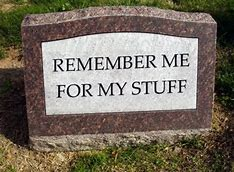 We keep hearing that middle class people are struggling. Statistics show that wages have risen almost not at all for middle-income people in the past 40 years. Our children may be the first generation to have a standard of living lower than their parents’.
We keep hearing that middle class people are struggling. Statistics show that wages have risen almost not at all for middle-income people in the past 40 years. Our children may be the first generation to have a standard of living lower than their parents’.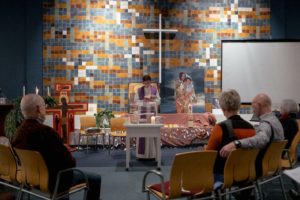 After our trip to Amsterdam in September, I’m a great admirer of the Dutch. I love how neat and pretty they keep their country. I like that they deeply respect work. The stained glass windows in their Rijksmuseum don’t just honor saints and kings; they honor professions: everything from philosopher to bricklayer. They have been literally building up their country for centuries by draining marshlands into tidy canals. And they are determined to survive climate change. They have intensified their efforts to keep the sea at bay. Electric cars and charging stations line the streets of their cities, and our train ride into Germany took us past miles and miles of windmills and solar farms. But they are fun-loving, too; all you have to do is walk down the street and take a whiff! And they are kind and polite: Holland and Germany are the only non-US countries we’ve travelled in where people offered us seats on public transportation because of our age.
After our trip to Amsterdam in September, I’m a great admirer of the Dutch. I love how neat and pretty they keep their country. I like that they deeply respect work. The stained glass windows in their Rijksmuseum don’t just honor saints and kings; they honor professions: everything from philosopher to bricklayer. They have been literally building up their country for centuries by draining marshlands into tidy canals. And they are determined to survive climate change. They have intensified their efforts to keep the sea at bay. Electric cars and charging stations line the streets of their cities, and our train ride into Germany took us past miles and miles of windmills and solar farms. But they are fun-loving, too; all you have to do is walk down the street and take a whiff! And they are kind and polite: Holland and Germany are the only non-US countries we’ve travelled in where people offered us seats on public transportation because of our age. 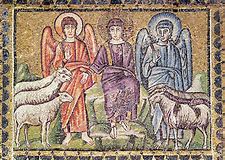 Jesus said that at the end of the world “All the nations will be gathered before him and he will separate people one from another as a shepherd separates the sheep from the goats, and he will put the sheep at his right hand and the goats at the left.” (Matthew 25, verse 32, NRSV)
Jesus said that at the end of the world “All the nations will be gathered before him and he will separate people one from another as a shepherd separates the sheep from the goats, and he will put the sheep at his right hand and the goats at the left.” (Matthew 25, verse 32, NRSV)
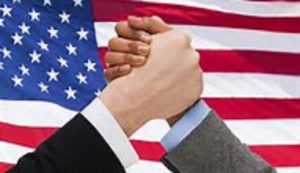 I ended my last blog post with the two questions:
I ended my last blog post with the two questions: Most children are afraid of ghosts, or big dogs, or the monster under the bed. Not I. When I was a little girl, I was afraid of Communists.
Most children are afraid of ghosts, or big dogs, or the monster under the bed. Not I. When I was a little girl, I was afraid of Communists. 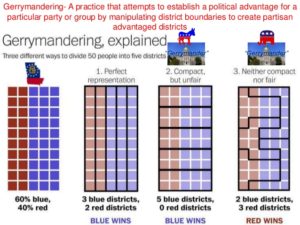 If you don’t believe me on gerrymandering, listen to what The Terminator has to say about it. Arnold Schwarzenegger has released a series of videos on this topic. The videos ate both informative and entertaining, Some include humor such as when he says that Congres is less popular than hemorrhoids, herpes, cockroaches and Nickelback.
If you don’t believe me on gerrymandering, listen to what The Terminator has to say about it. Arnold Schwarzenegger has released a series of videos on this topic. The videos ate both informative and entertaining, Some include humor such as when he says that Congres is less popular than hemorrhoids, herpes, cockroaches and Nickelback.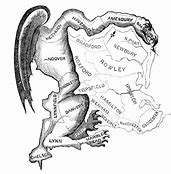 Are you sick of partisan politics and political gridlock? Do you wish the Pennsylvania state legislature could ever pass a budget without a last-minute fire drill? Then you should care a lot about gerrymandering.
Are you sick of partisan politics and political gridlock? Do you wish the Pennsylvania state legislature could ever pass a budget without a last-minute fire drill? Then you should care a lot about gerrymandering. 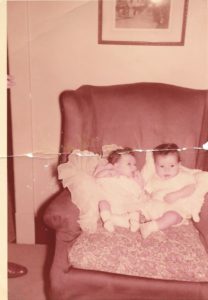 Be honest: you hope your funeral will be well-attended. You want people to have to drive around the funeral-home parking lot searching for a space, while inside at least 100 friends and relatives speak in low voices about what a wonderful person you were, what great memories they have of you.
Be honest: you hope your funeral will be well-attended. You want people to have to drive around the funeral-home parking lot searching for a space, while inside at least 100 friends and relatives speak in low voices about what a wonderful person you were, what great memories they have of you. d, and we had to stand outside the polling place, not inside where it was nice and warm and people had donuts. We were well-prepared. We wore gloves, hats, thick socks, and heavy coats over heavy sweaters. And the nice people from Fair Districts had provided us with hand and foot warmers in addition to petitions and pens. But it was still cold, and we were out there from the minute the polls opened until about noon, when our relief arrived . Our faces were numb, our fingers were popsicles and our feet were blocks of ice.
d, and we had to stand outside the polling place, not inside where it was nice and warm and people had donuts. We were well-prepared. We wore gloves, hats, thick socks, and heavy coats over heavy sweaters. And the nice people from Fair Districts had provided us with hand and foot warmers in addition to petitions and pens. But it was still cold, and we were out there from the minute the polls opened until about noon, when our relief arrived . Our faces were numb, our fingers were popsicles and our feet were blocks of ice.